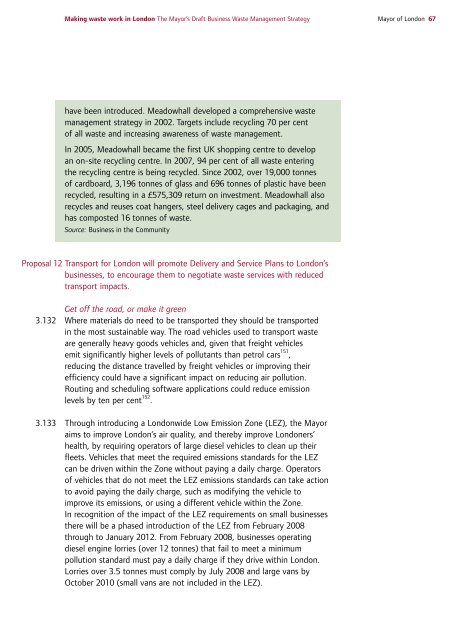Draft Business Waste Strategy PDF - london.gov.uk - Greater ...
Draft Business Waste Strategy PDF - london.gov.uk - Greater ...
Draft Business Waste Strategy PDF - london.gov.uk - Greater ...
Create successful ePaper yourself
Turn your PDF publications into a flip-book with our unique Google optimized e-Paper software.
Making waste work in London The Mayor’s <strong>Draft</strong> <strong>Business</strong> <strong>Waste</strong> Management <strong>Strategy</strong> Mayor of London 67<br />
have been introduced. Meadowhall developed a comprehensive waste<br />
management strategy in 2002. Targets include recycling 70 per cent<br />
of all waste and increasing awareness of waste management.<br />
In 2005, Meadowhall became the first UK shopping centre to develop<br />
an on-site recycling centre. In 2007, 94 per cent of all waste entering<br />
the recycling centre is being recycled. Since 2002, over 19,000 tonnes<br />
of cardboard, 3,196 tonnes of glass and 696 tonnes of plastic have been<br />
recycled, resulting in a £575,309 return on investment. Meadowhall also<br />
recycles and reuses coat hangers, steel delivery cages and packaging, and<br />
has composted 16 tonnes of waste.<br />
Source: <strong>Business</strong> in the Community<br />
Proposal 12 Transport for London will promote Delivery and Service Plans to London’s<br />
businesses, to encourage them to negotiate waste services with reduced<br />
transport impacts.<br />
Get off the road, or make it green<br />
3.132 Where materials do need to be transported they should be transported<br />
in the most sustainable way. The road vehicles used to transport waste<br />
are generally heavy goods vehicles and, given that freight vehicles<br />
emit significantly higher levels of pollutants than petrol cars 151 ,<br />
reducing the distance travelled by freight vehicles or improving their<br />
efficiency could have a significant impact on reducing air pollution.<br />
Routing and scheduling software applications could reduce emission<br />
levels by ten per cent 152 .<br />
3.133 Through introducing a Londonwide Low Emission Zone (LEZ), the Mayor<br />
aims to improve London’s air quality, and thereby improve Londoners’<br />
health, by requiring operators of large diesel vehicles to clean up their<br />
fleets. Vehicles that meet the required emissions standards for the LEZ<br />
can be driven within the Zone without paying a daily charge. Operators<br />
of vehicles that do not meet the LEZ emissions standards can take action<br />
to avoid paying the daily charge, such as modifying the vehicle to<br />
improve its emissions, or using a different vehicle within the Zone.<br />
In recognition of the impact of the LEZ requirements on small businesses<br />
there will be a phased introduction of the LEZ from February 2008<br />
through to January 2012. From February 2008, businesses operating<br />
diesel engine lorries (over 12 tonnes) that fail to meet a minimum<br />
pollution standard must pay a daily charge if they drive within London.<br />
Lorries over 3.5 tonnes must comply by July 2008 and large vans by<br />
October 2010 (small vans are not included in the LEZ).
















